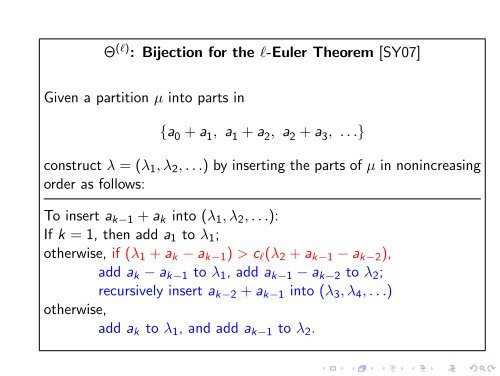Euler's partition theorem and the combinatorics of -sequences
Euler's partition theorem and the combinatorics of -sequences Euler's partition theorem and the combinatorics of -sequences
Θ (l) : Bijection for the l-Euler Theorem [SY07] Given a partition µ into parts in {a 0 + a 1 , a 1 + a 2 , a 2 + a 3 , . . .} construct λ = (λ 1 , λ 2 , . . .) by inserting the parts of µ in nonincreasing order as follows: To insert a k−1 + a k into (λ 1 , λ 2 , . . .): If k = 1, then add a 1 to λ 1 ; otherwise, if (λ 1 + a k − a k−1 ) > c l (λ 2 + a k−1 − a k−2 ), add a k − a k−1 to λ 1 , add a k−1 − a k−2 to λ 2 ; recursively insert a k−2 + a k−1 into (λ 3 , λ 4 , . . .) otherwise, add a k to λ 1 , and add a k−1 to λ 2 .
The insertion step To insert a k + a k−1 into (λ 1 , λ 2 , λ 3 , λ 4 , . . .) either do (i) (λ 1 + a k , λ 2 + a k−1 , λ 3 , λ 4 , . . .) or (ii) (λ 1 + (a k − a k−1 ), λ 2 + (a k−1 − a k−2 ), insert (a k−1 + a k−2 )into(λ 3 , λ 4 , . . .)) How to decide? Do (ii) if the ratio of first two parts is okay, otherwise do (i).
- Page 1 and 2: Euler’s partition theorem and the
- Page 3 and 4: Overview Euler’s partition theore
- Page 5 and 6: Overview 1, 2, 3, . . . l-sequences
- Page 7 and 8: Overview 1, 2, 3, . . . l-sequences
- Page 9 and 10: Sylvester’s Bijection
- Page 11 and 12: l-sequences For integer l ≥ 2, de
- Page 13 and 14: l-sequences For integer l ≥ 2, de
- Page 15 and 16: l = 2 The l-Euler theorem [BME2]: T
- Page 17: l = 3 The l-Euler theorem [BME2]: T
- Page 22 and 23: Binary numeration system 1 0 1 1 0
- Page 24 and 25: Binary numeration system 1 0 1 1 0
- Page 26: Theorem [Fraenkel 1985] Every nonne
- Page 31 and 32: Lecture Hall Partitions
- Page 33 and 34: The Lecture Hall Theorem [BME1] The
- Page 35 and 36: Θ (l) n : Bijection for the l-Lect
- Page 44 and 45: Truncated lecture hall partitions L
- Page 46 and 47: Theorem [Corteel,S 2004] Given posi
- Page 48 and 49: The l-nomial coefficient Example (
- Page 50 and 51: Let u l and v l be the roots of the
- Page 52 and 53: Let u l and v l be the roots of the
- Page 54 and 55: An l-nomial theorem [LS]: An analog
- Page 56 and 57: A coin-flipping interpretation of t
- Page 58 and 59: Define a q-analog of the l-nomial:
- Page 60 and 61: Another q-analog of the l-nomial Le
- Page 62 and 63: Question: When l = 2, several refin
- Page 64 and 65: Question: What is the generating fu
- Page 66 and 67: CanaDAM 2009 2nd Canadian Discrete
Θ (l) : Bijection for <strong>the</strong> l-Euler Theorem [SY07]<br />
Given a <strong>partition</strong> µ into parts in<br />
{a 0 + a 1 , a 1 + a 2 , a 2 + a 3 , . . .}<br />
construct λ = (λ 1 , λ 2 , . . .) by inserting <strong>the</strong> parts <strong>of</strong> µ in nonincreasing<br />
order as follows:<br />
To insert a k−1 + a k into (λ 1 , λ 2 , . . .):<br />
If k = 1, <strong>the</strong>n add a 1 to λ 1 ;<br />
o<strong>the</strong>rwise, if (λ 1 + a k − a k−1 ) > c l (λ 2 + a k−1 − a k−2 ),<br />
add a k − a k−1 to λ 1 , add a k−1 − a k−2 to λ 2 ;<br />
recursively insert a k−2 + a k−1 into (λ 3 , λ 4 , . . .)<br />
o<strong>the</strong>rwise,<br />
add a k to λ 1 , <strong>and</strong> add a k−1 to λ 2 .



